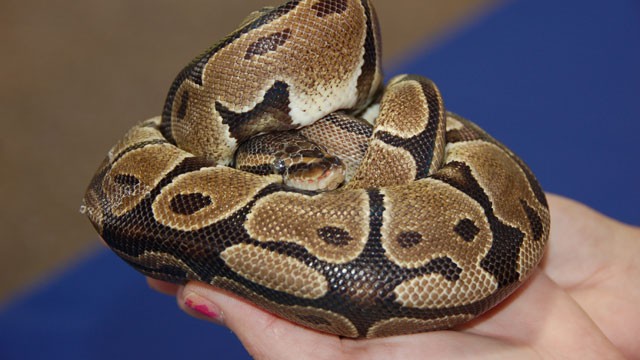Florida Opens Door for Owners to Surrender Exotic Pets
Got a Burmese python, a boa constrictor or a red-eared slider turtle that's eating you out of house and home -- and isn't exactly a legal resident in your neighborhood? Florida Fish and Wildlife Conservation may have the answer for you.
The FWC held its first Exotic Pet Amnesty Day -- an event for exotic pet owners looking to give up their animals, no questions asked.
In all, 64 animals were turned in, including a leopard gecko, two Madagascar giant chameleons, pythons, boas, turtles, fish, and about 30 Australian sugar gliders -- marsupials from Australia similar to flying squirrels, according to the FWC.
During the event, pet owners can turn in their animals without facing any consequences. But according to FWC officials, most people who turned in animals said they just couldn't keep them.
"In many cases, people said they just couldn't care for them anymore. One of the turtles kept growing and they couldn't accommodate its space needs," FWC's Joy Hill told ABC News.
"Things just got out of control for the woman who impulsively bought a sugar glider and then a couple more to breed with it," Hill said. "She ended up turning in about 25 of them, including a few little babies -- they are prolific breeders."
Veterinarians at the event taught attendees about the animals and their proper care, and all of the animals were adopted by individuals or facilities capable of caring for them, as determined by the FWC.
The main idea behind the event, and the no-questions-asked policy, is to prevent people from simply releasing the animals into the wild once they can no longer care for them -- a practice that can cause some serious problems, Hill said.
"Some exotic species can and have gained a strong and invasive foothold in Florida due in part ot the inviting habitat and climate," she said. "For the sake of these unwanted pets and native Florida habitats and species, it's very important for people who tire of these pets not to release them."
Last month, the release of dozens of dangerous animals from a private farm drew national attention to the problem. Before killing himself, Terry Thompson opened the cages of his dozens of lions, tigers, bears, wolves, and monkeys, many of which were killed while running loose in an Ohio community.
The tragedy in Ohio prompted renewed calls for stricter laws regarding the ownership of exotic animals.
"There's no reason for any private citizen to have a bear or a lion or a chimpanzee or a green anaconda in their home," Humane Society President and CEO Wayne Pacelle told ABC News.
Not all exotic animals are illegal to own, but it is important to make sure you're prepared if you chose to bring one home, Hill said.
"We urge people to learn and study about any potential pet before obtaining it to avoid the heartbreak of one day having to make the choice of giving it up," she said.
05/11/2011 15h14 - Atualizado em 05/11/2011 22h50
Cobra de seis metros capturada em estrada do AM é solta no Rio Negro
Animal foi libertado na Ilha de Paricatuba, no município de Iranduba.
A 'anaconda' tentou fugir duas vezes.
 Cobra de seis metros foi solta em seu habitat natural
Cobra de seis metros foi solta em seu habitat natural(Foto: Daniela Branches/TV Amazonas)
A cobra sucuri de aproximadamente seis metros capturada na noite desta sexta-feira (4) em Manaus foi solta na Ilha de Paricatuba, no município de Iranduba, a 27 km da capital. O animal foi reintroduzido ao seu habitat natural.
O réptil famoso pelas lendas da 'Anaconda' foi resgatado pelo autônomo Fernando Alberto, de 30 anos. Ele retirou o animal da pista da estrada da Cachoeira Alta, bairro Tarumã, Zona Oeste de Manaus e contatou o Batalhão Ambiental da Polícia Militar (BAPM).
Nesta manhã, Fernando Alberto e policiais do Batalhão encaminharam a cobra à sede fluvial do BAPM. No caminho, o animal tentou fugir do veículo, precisando da ajuda de um homem para segurar a cobra.
A sucuri foi levada à Ilha de Paricatuba em um barco. Ela ainda tentou fugir da embarcação, mas foi impedida pelos policiais. Apesar de apresentar estado de saúde estável, o animal aparentava estar abatido e cansado.

Após ser solta nas águas do Rio Negro, a sucuri nadou livremente. Para Fernando Alberto, era importante liberar a cobra e deixá-la sobreviver.
"Eu e meus amigos imobilizamos a cobra e a tiramos da pista porque tem alguns caminhoneiros que não poupam animais", contou.
Cobra de 6 metros de comprimento foi encontrada na Zona Oeste de Manaus
O réptil foi encontrado na estrada da Cachoeira Alta, bairro Tarumã.
Animal será solto próximo ao Arquipélago de Anavilhanas.
 Cobra de aproximadamente 6m de comprimento
Cobra de aproximadamente 6m de comprimento(Foto: Tiago Melo/G1 AM)
Uma cobra sucuri de aproximadamente seis metros de comprimento foi capturada em via pública na noite desta sexta-feira (4), por volta das 21h, na estrada da Cachoeira Alta, bairro Tarumã, Zona Oeste de Manaus.
O réptil famoso pelas lendas da 'Anaconda', foi resgatado pelo autônomo Fernando Alberto, de 30 anos, que retirou o animal da pista e entrou em contato com o Batalhão Ambiental da Polícia Militar (BAPM).
"Eu e meus amigos imobilizamos a cobra e tiramos ela da pista porque tem alguns caminhoneiros que não poupam animais. Colocamos o réptil na caçamba da picape e chamamos as autoridades ambientais neste sábado (5) pela parte da manhã", contou ao G1.
De acordo com informações do cabo Ivani Maximos do BAPM, o animal apresenta estado de saúde estável e será solto em breve em seu habitat natural, próximo à ilha de acesso ao Arquipélago de Anavilhanas, a 100 km de Manaus.
 Animal apresenta estado de saúde estável e será solto em Anavilhanas (Foto: Tiago Melo/G1 AM)
Animal apresenta estado de saúde estável e será solto em Anavilhanas (Foto: Tiago Melo/G1 AM)Exibir mapa ampliado
27/07/2009:
8 FEET IN SUCURI snake river bed in the city of Taquari in Mato Grosso do Sul, Brazil
Sphere: Related Content
![Validate my Atom 1.0 feed [Valid Atom 1.0]](valid-atom.png)




























































Nenhum comentário:
Postar um comentário